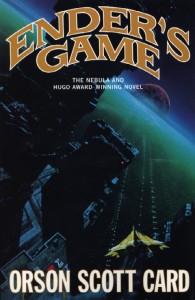
“Ender’s Game” by Orson Scott Card
Imagine a world where every day you have to worry about the threat of a second alien invasion. Military officials plug a monitor into the back of your neck and watch your every move from a remote distance. If you pass their test of personality and intelligence, you’re whisked away to an international battle school where you learn the techniques to conquer your foes.
The world in Orson Scott Card’s “Ender’s Game” seems far removed from reality, a Hogwarts of the science-fiction world, and maybe it really is just another implausible future made up in some author’s head. But then again, maybe it’s not.
Currently, we can feel safe in the knowledge that we don’t have to worry about a swarm of otherworldly insects taking over the planet. We’re not being individually observed through strange, minute devices, and I’m guessing that most of us will never learn the strategic ins and outs of zero-gravity combat. However, when you peel back the layers of sci-fi that blanket Ender Wiggin’s greatest struggles, what you get is a story that seemingly applies to each and every one of us.
Like Ender, we’re all raised according to certain societal standards of education. For the first couple of years, it’s about learning the basics, but then you graduate to Battle School. For the next four years of high school, you’re introduced to chaos as tests become more rampant and the competition intensifies.
Ender was just a child when he was whisked away by the military. He learned mind and combat games to enhance his education, and he was forced to experiment with the balance between tradition and innovation. He knew that the games of war were just simulations of the real thing, but they still held real, tangible importance by determining his scores and ranking among his peers.
Haven’t we all gone through this process already? That stressful period of completing multiple college applications and striving to make our life dreams a reality before we had actually set foot in a university classroom seems all too similar to the struggles Ender must contend with. We’ve all played the game, taking AP and honors classes that didn’t even seem particularly interesting just to compete with thousands of other similar kids. We struggled with every essay we sent out, wondering if we were one of the lucky ones who had an attention-grabbing idea that broke the norm without completely overstepping it.
So what comes afterward, when our painstaking efforts are recognized at long last? For Ender, it was Command School, where all he had ever learned would prepare him to lead others in the real world. For us, it’s Georgetown University, and we’re taught just the same. Most of us have heard the notion that we are the leaders of tomorrow, and as scary or doubtful as it seems, it’s more or less true. High school was the game, and college gears you up for what’s beyond it. The cost, however, is still up for question.
We definitely still have some teenage shortcomings, like when we ignore long-term consequences and do what we want on impulse. However, from high school through college we’re bred to look, think and act like adults. We shed our light-up sneakers for business appropriate shoes and pile up a layer of textbooks in the place of our old stuffed animals.
This change is arguably good. We’re adapting to the future and growing up like Ender. We’re getting a head start by maturing early on so we’ll be ready to face anything and everything. Yet we lose something in the process. We shake our legs, drum our pencils and twist around in our seats during class because we want to be somewhere and do something that stimulates our entire selves rather than just our brains. Our minds are aging faster than our bodies, and we run the risk of burning out too soon.
There is a moment in “Ender’s Game” where Ender Wiggin reaches a breaking point. He can’t face the world of Command School and refuses to continue his training. He builds himself a simple raft on a lake that reminds him of Battle School, where everything was still just a game and not yet bordering on reality. For his superiors, this is a scary turn of events because it meant the possible end of his brilliance and hard work; for Ender, it meant the prolonging of his childhood.
As he lies there basking in the sun, Ender is just another kid again. He could at once be criticized for his lack of responsibility or admired for his purposeful backlash of untroubled repose. Beyond our own amazing yet stressful summer internships, the season itself is waiting to be enjoyed. We can all find at least one moment during the next few months where the only thing we want and should do is throw on a swimsuit, and, like Ender, rediscover our simplest selves. In the end, it’s our dollhouses and our Lego castles, our freedom and our imagination, that create the true building blocks of an empire.
Hannah Kaufman is a rising sophomore in the College. Back to Futures Past appears every other Monday at thehoya.com.













